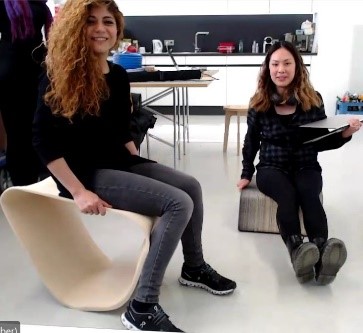On 28 April 2022, IntCDC researchers from the Institute for Computational Design and Construction (ICD), the Max Planck Institute for Intelligent Systems (MPI-IS), the Institute of Social Sciences (SOWI 5) and the Materials Testing Institute (MPA) offered three bilingual workshops for female students in grades 9 and 10.
The teams shared their passion for self-forming wood, robotics, and eco-synergetic wood design with nearly 30 female students, conveying the message that science, technology, engineering and mathematics (STEM) can be absolutely exciting and very rewarding to pursue in academic and professional careers!
In addition to introducing their field of work, the mostly female team members were asked by the girls about their typical dai and personal background – what they studied, how they decided to become a scientist, when and how they knew which field they wanted to work in. The answers were as diverse as the team members themselves, but they all had one thing in common: the courage to do what they find most fascinating.
Most of the students came from outside Stuttgart; in the two online workshops, participants came from all over Germany. Communication was mainly in English, and the researchers were very impressed by the girls' English skills.
Below is a brief report on each of the workshops with some pictures and quotes from the students.
Workshop 1 – Self-Shaping Wood: Materials Science Meets Architecture
This online workshop by researchers from the Institute for Computational Design and Construction (ICD) offered a behind-the-scenes look at research on wood as a building material in architecture and furniture making. Because of its special properties, wood can be used to create self-forming components for buildings or elements that respond to weathering without the need for electricity. Other advantages of wood include its affordability and biodegradability.

Prior to the workshop, the students were given a packet of pine cones and two samples of two-ply wood, which they experimented with themselves during the workshop by adding or removing moisture. Participation was high and many practical questions were asked, such as how long it takes to build of the BUGA pavilion, how to prevent mould on damp wood and whether it is possible to varnish the wood without affecting the desired shape of the wood.
The workshop was organised by IntCDC researchers Tiffany Cheng, Laura Kiesewetter and Dylan Wood.
Some student voices on the workshop:
“I really enjoyed it and it made me want to do it myself. What are the prerequisites to study this?"
"Very interesting. I didn't know there was research on wood shaping."
" The biological models were very interesting. I'd like to change something about the way building is done, especially in terms of being environmentally friendly."
Workshop 2 – Integrated Eco-Synergetic Wood Design
Organised by researchers from the Institute of Social Sciences (SOWI) and the Materials Testing Institute (MPA), the on-site workshop focused on wood materials science and biodiversity in an urban environment. After the scientific introduction, participants conducted hands-on experiments at three learning stations: Measuring the moisture content of wood using different methods, ecological optimisation of water supply for plant growth, and observing bees using a Citizen Science mobile application.
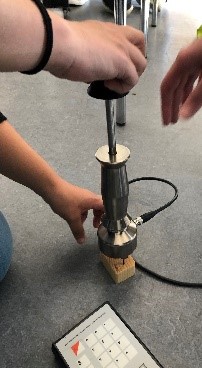
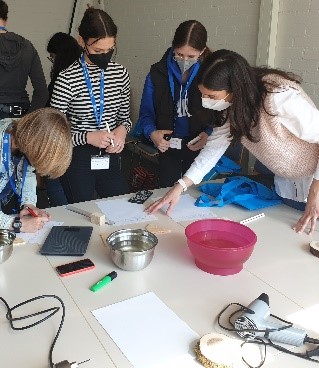
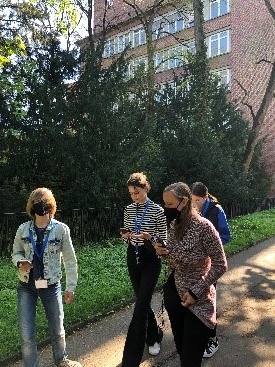
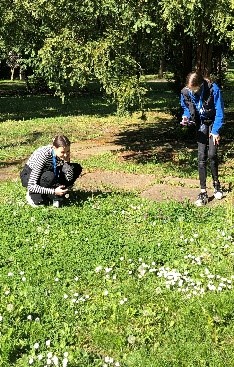
The workshop was organised by Marie Davidova, Serena Gambarelli, Mariah Guimaraes, Martha Teye and Noé Fararoni.
Some comments from the participants:
“I liked working together in the groups on the respective projects."
"It was fun and I learned many new things."
"Interesting, rich in information, different directions. The organizers were very friendly and encouraging."
Workshop 3 – Robots that build, feel and interact with humans
In this online workshop, a team of researchers from the Institute for Computational Design and Construction (ICD) and the Max Planck Institute for Intelligent Systems (MPI-IS) took a virtual tour of various research labs where robots live. Various robots were shown assembling a toy structure, printing a chair, and performing social interactions. To make the online workshop more hands-on, each participant received a miniature model of the chair they had previously designed.
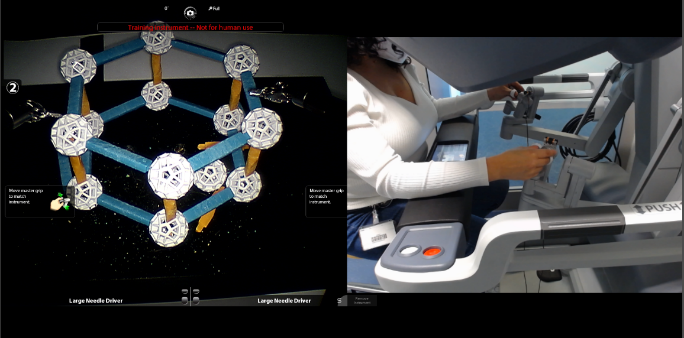
The workshop was organised by IntCDC researchers Tiffany Cheng, Yijie Gong, Mayumi Mohan, Yasaman Tahouni, Katja Rinderspacher and Dylan Wood.
Some statements from the participants:
"My opinion about robots has totally changed. Before, I was interested in programming and stuff, but now I see that it's also something very practical."
"I worked with robots in school, but this is more productive with a real end product."
"I would love to write scripts for medical robots."
Girls' Day and Boys' Day at the University of Stuttgart
Girls' Day and Boys' Day are annual events that offer girls and boys insights into activities that they usually do not consider for their own career choice. In 2022, students were able to choose from more than 11,000 opportunities in companies and institutions. As a leading technically oriented university with a proportion of around two-thirds male students, the University of Stuttgart focuses on promoting women in STEM courses and research.
More information on Girls' Day and Boys' Day



